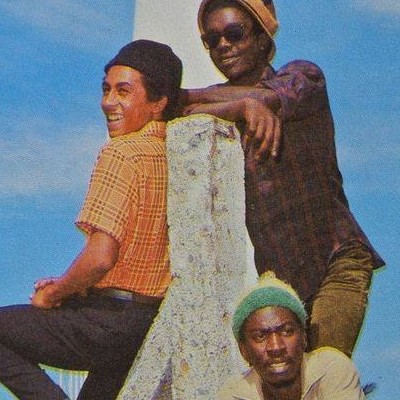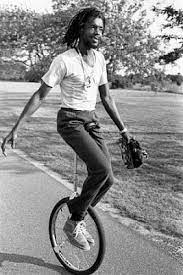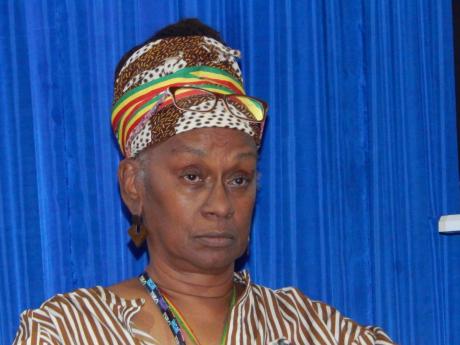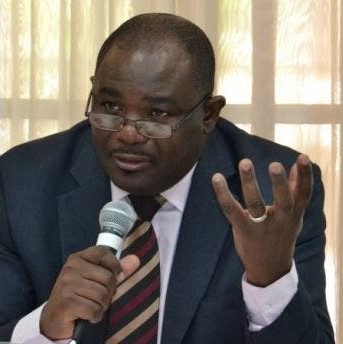Information-packed poetry, music symposium at IOJ
By Michael Reckord/Gleaner Writer—

Michael Reckord/PHOTO–Allan ‘Skill’ Cole (left) being questioned by Yasus Afari.—
The manager of Bob Marley and the Wailers had to threaten and actually “get a little rough” with the radio disc jockeys who refused to play his clients’ music in the early 1970s. In fact, it seemed to him that the music of the group, and of other Rastafarian reggae artistes, was at the time officially banned by the leading radio stations.
Speaking in the auditorium of the Institute of Jamaica (IOJ) on Sunday, the manager said that his tactics worked and the music started to get airplay. The rest is history. Led by Marley, Jamaican reggae music went on to the conquer the world.
The talk by the manager, former Jamaican football superstar Allan ‘Skill’ Cole, was one of about a dozen given at the Jamaica Poetry, Music Symposium (JPMS) 2023, presented by performance poet Yasus Afari’s company, SenYAcum, and the Jamaica Music Museum, an affiliate of the IOJ. Some information-packed presentations were live, as solo or panel items; others came via electronic media.
DAILY REPORT

An example of a roughing up cited by Cole involved Peter Tosh, one of the Wailers, grabbing a well-known Radio Jamaica music presenter by his collar and dragging him out of his office, then threatening him with further harm if he didn’t play their music. Cole knew it hadn’t been played – though several copies of a particular record had been left with various people in the station – because, he said, he got daily reports from two women he paid to listen out for the music on the radio.
The story evoked much laughter from the audience, and led to an amused Yasus Afari declaring that he did not in any way endorse violence to disc jockeys.
Another less titillating but equally interesting anecdote that Cole related was about his efforts to get Marley, Tosh and Bunny Wailer physically fit. Their training involved the daily playing of football and running – though Tosh preferred karate – as well as rhythm and coordination exercises, like skipping. It led, Cole said, to the trio’s having improved stamina for their on-stage performances.

Eventually, Bob could run for two, two and a half hours on stage during a show without getting tired, Cole said. He also lauded Marley’s discipline, as he was always the first to get on the tour bus, thereby setting an example for the others.
Many other performers got into the fitness habit, Cole said, adding, “Football and training helped to carry Bob to another level, musically and spiritually. Discipline carried him to the top of the world.”

The JPMS 2023 was organised under the theme ‘Taking Ownership and Responsibility; Transforming Lives, Shaping Our Future’, with the intention “to analyse, evaluate and assess our history, cultural heritage and aspirations as a nation with a global influence”.
The audience heard that among the many challenges faced by those in the reggae music industry was the fact that most reggae festivals took place abroad and included no Jamaican acts. That was according to booking agent Jerome Hamilton of Headline Entertainment.

Intellectual property rights specialist Maxine Stowe revealed that while the majority of the money made by Jamaican reggae musicians was earned abroad, for various reasons many of those involved didn’t want the money to reach Jamaica. That meant the island was losing out on revenue.
Though informative, some of the symposium’s presentations were only tangentially related to either music or poetry. For example, Philip Clarke, the director of the University of Technology, Jamaica’s Centre for the Arts, gave a talk on the use of Patois by teachers and professional performers, making the point that the former disdained it, while the latter embraced it. He said that in one of his classes he judiciously mixed Patois and standard English, enabling the students, who would have otherwise failed, to pass their Caribbean Secondary Education Certificate exams at the Grade 1 and Grade 2 levels.

The Broadcasting Commission of Jamaica’s Executive Director, Cordel Green, said that while Jamaica is officially rated among the top 10 countries for freedom of expression and there is much that is positive on our radio and television stations, people continually complain to him about the negative things they hear on those media. Why don’t they listen to and watch the good material? he asked. He warned that artificial intelligence was gradually replacing humans in media, often without viewers and listeners realizing it.

These were some of the briefer presentations made. Via PowerPoint, Montego Bay physician Dr Winsome Miller-Rowe told us of the strong positive correlation between academic success and music lessons; the operators of the Mi Hungry vegetarian restaurants tried to prove scientifically that human should not eat meat; assisted by drummer Calvin Mitchell, the educator, poet and performer Opal Palmer Adisa gave a quick lesson in creating poetry with drum rhythms; and the operator of Caveman sound system spoke about the importance of those in his profession playing “positive, uplifting” music.
The next JPMS is scheduled for Sunday, March 31, 2024.


You must log in to post a comment.